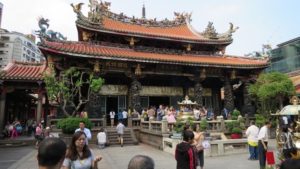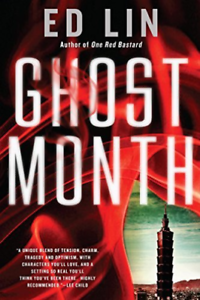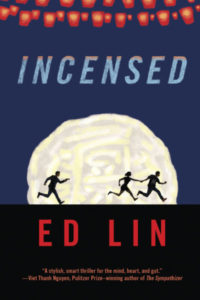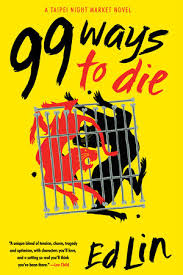 The results of the last elections in Taiwan were very surprising. When rereading some of the comments, it is clear that the fundamentals may have been forgotten in favour of personal preferences. The Taiwanese American writer Ed Lin, in a series of three detective novels, “A Taipei night market novel” (1), praises the charms of Taipei and reminds us of the essential features of Taiwanese history and society.
The results of the last elections in Taiwan were very surprising. When rereading some of the comments, it is clear that the fundamentals may have been forgotten in favour of personal preferences. The Taiwanese American writer Ed Lin, in a series of three detective novels, “A Taipei night market novel” (1), praises the charms of Taipei and reminds us of the essential features of Taiwanese history and society.
– Ed Lin, an atypical writer:
Ed Lin was born in New York in a Taiwanese family who ran a hotel. He completed a Bachelor of Science at Columbia University, followed by literary studies and a school of journalism. He has been a financial journalist for 24 years at Barons. He is also an actor in several films and in some cases with his wife Cindy Cheung. He is a music lover who plays the bass guitar and a fan of the band Joy Division.
He passed on his Chinese name, Jing-nan, and his passion to the hero of his three “Taiwanese” novels (1): the restaurant run by Jing-nan is called “Unknown Pleasures” after Joy Division’s cult album (1979). The famous cover of the record is inspired by the graphics of the recorded signals of the first pulsar discovered.
Ed Lin’s family history is a summary of Taiwan’s: his father’s family has been Taiwanese since the end of the Ming dynasty, they are ethnic Taiwanese (benshengren) from central Taiwan while his mother’s family from northern China is part of the more than a million (waishengren) group that took refuge in Taiwan after Chiang Kai-shek’s defeat.
-Three detective novels to make us love Taipei (1):
 Ed Lin likes the old Wanhua district and Longshan Temple, which plays a role under several occasions, as does the Da’an district or Tower 101. This 500-metre tower was the highest skyscraper in the world but looks small compared to Dubai’s Burg Khalifa. Similarly, the cable car to reach the Maokong tea fields is important in his latest novel.
Ed Lin likes the old Wanhua district and Longshan Temple, which plays a role under several occasions, as does the Da’an district or Tower 101. This 500-metre tower was the highest skyscraper in the world but looks small compared to Dubai’s Burg Khalifa. Similarly, the cable car to reach the Maokong tea fields is important in his latest novel.
He also talks about the beautiful buildings of the Japanese colonization, many of which are official buildings. Cultural links are strong, Japan’s impact has been significant and lasting.
Jing-nan and his cousin also visit garrison villages; these “juancun”, in danger of disappearing, built in haste and which in 1967 sheltered a quarter of the Chinese who had withdrawn from the continent (3).
An essential character in the novels is Shilin’s Night Market. It is there that Jing-nan manages “Unknown Pleasures”, one of the 500 small restaurants in Shilin, the largest Night Market in northern Taipei, opened in 1913 and refurbished a few years ago.
– “Mainlanders” and “Yams”:

Shilin Night Market
Jing-nan’s family operated a farm on the west coast before creating a food stall in the 1950s. They are “benshengren”, “yams”; his grandparents do not appreciate the mainlanders (waishengren) who are associated with the Kuomintang (KMT) who ruled Taiwan from 1945 to the 2000s before the arrival in power of the DPP, supported mainly by the “yams” and with independence as a possible target.
This division is essential to understand Taiwan’s history and the country’s political/economic life. But, as Ed Lin says, “then came the Japanese and then the mainlanders. Taiwan history is a long tale of waiting game. Waiting for people you don’t get along with to leave and then realizing one day the’ve become part of you”. (Incensed, p. 197).
Jing-nan has to interrupt his studies at UCLA and return to Taipei upon the death of his parents and assume the family debts as well as the running of the restaurant. All this takes him away from his fiancée Julia, with whom he grew up and who also studied in the United States.
Jiang-nan will show us how to successfully manage his restaurant and use his command of English to attract tourists, how he now adapts and prepares vegan dishes, how to bring in a singer, his cousin Mei Ling or a media personality, Tong Tong, Peggy’s father, his high school friend.
– Jing-nan and his circle:

Longshan temple
Jing-nan has two very different assistants: Dwayne, an Aboriginal Amis who constantly evokes the misdeeds of Chinese colonization in Taiwan even though he is aware that the civilization of the 500,000 Aborigines and their fourteen tribes is struggling to survive in a consumer society.
His friend Frankie the Cat was one of the elite troops of the KMT but he was arrested and sent to the Green Island camp (4) for ten years before it was discovered that his brother was not, as believed, a communist officer in China. This stay will allow Frankie to make many friendships with the underworld, not so much with the “jiaotous”, the little neighbourhood thugs, as with the underworld, often linked to business and the mainlanders.
Jing-nan’s uncle, Big Eye, organized a criminal network in Taichung, south of Taipei. Superstitions govern an essential part of his daily life, from visits to temples to monks’ predictions. In Taiwan, the temples are full of faithful, there are 15,000 places of worship and 26 religions listed. “Taiwanese are the most superstitious people in the industrialized world” (Ghost Month, p.6). This has a significant impact on daily life, behaviours, what to say or not to say….
 As a teenager, Jing-nan was quite the opposite, “now however, I know that burning incense, throwing down divining wood blocks, or asking a fortune teller’s approval on life decisions such as home purchases or marriage is just a matter of setting one’s mind at ease, finding comfort in the moderate hell of indecision in the greater hell that life can be” (Incensed p.121).
As a teenager, Jing-nan was quite the opposite, “now however, I know that burning incense, throwing down divining wood blocks, or asking a fortune teller’s approval on life decisions such as home purchases or marriage is just a matter of setting one’s mind at ease, finding comfort in the moderate hell of indecision in the greater hell that life can be” (Incensed p.121).
-Three novels in succession:
The advantage of reading three detective novels in succession is to assess whether the characters and intrigues are strong enough to attract attention. Characters, in my opinion, are essential and it is appropriate for the novelist to love his characters and be close to them. This is the case with Ed Lin who lent a lot to Jing-nan.
a/ “Ghost Month” and the CIA:
“During Ghost Months, supposedly, the gates of the underworld are opened and spirits are allowed to walk among the living once again”; during this month, many Taiwanese are concerned about the spirit world. Jing-nan learns of the death of his fiancée Julia, whom he has not seen since her return from the USA and who had become a “betel nut girl”.
Betel nuts are chewed by millions of people in Asia despite the risk of oral cancer; betel nut girls, often with sexy dresses, are there to encourage consumption. Jing-nan will investigate  Julia’s death and will quickly be threatened by gangsters and CIA agents; he will eventually understand how Julia became a betel nut girl.
Julia’s death and will quickly be threatened by gangsters and CIA agents; he will eventually understand how Julia became a betel nut girl.
b/ “Incensed” and Mei-ling the daughter of Big Eye:
Mei-ling is sixteen years old, she wants to become a pop star and has an Indonesian boyfriend; this drives her father Big Eye, a racist and homophobic criminal, crazy. He asks his nephew Jing-nan to take charge of Mei Ling in Taipei and to keep her away from Chong her boyfriend. Jing-nan made her do an internship at Peggy, a high school friend from a very powerful family of mainlanders. Mei-ling evaporates in Maokong, but is she still in love with Chong?
Big Eye’s homophobia is not exceptional, a recent referendum did not endorse gay marriage, a result that came as a great surprise. This point is mentioned in the book to underline that in a student demonstration, the homosexual question is treated as a completely secondary issue (p. 149).
c/ “99 Ways to Die” and spying on semiconductors:
Tong Tong, Peggy’s father is a mainlander, “one of those guys who lived to work and worked to live, in other words, a typical Taipei person” (p.139). He is aggressively pro-China and Jing-nan points out “here’s one thing I don’t understand about mainlanders. How come when they came in 1949, they were all about “Kill the Commies” but now they love the People’s Republic?”
This is why the young generation “born in the years following the Tiananmen crackdown…wondered what we could possibly have in common with a government and events in China,  which is what many non-businessmen in Taiwan regard as a foreign and hostile country” (p.37).
which is what many non-businessmen in Taiwan regard as a foreign and hostile country” (p.37).
Tong Tong is kidnapped, a ransom must be paid not in cash but delivering the plans of a very low power integrated circuit, important for the future of electronics. China’s lag in the semiconductor industry is an essential point and the current attitude of the United States is also explained by the desire to maintain its lead. Taiwan is a privileged supplier to China and the plot of the novel is inspired by real Chinese spying events on Micron Technologies (5).
Bertrand Mialaret
(1) Ed Lin, “Ghost Month”, Soho Crime, 2014, 330 pages.
Ed Lin, “Incensed”, Soho Crime, 2016, 320 pages.
Ed Lin, “99 Ways to Die”, Soho Crime, 2018, 270 pages.
(2) Ed Lin first wrote three detective novels on Chinatown with American detective Robert Chow, “This is a Bust” (2007), “Snakes Can’t Run” (2010) and “One Red Bastard” (2012), which won numerous awards.
(3) Angel Pino, “Taiwan, la littérature des villages de garnison”. Les Temps Modernes, July-September 2014, Page 144 to 184.
(4) On Green Island, the massacre of 28/2/1947 and the “White Terror” of Chiang Kai-shek, read “Green Island” of Shawna Yang Ryan.
(5) The New York Times, “Inside a Heist of American Chip Designs, as China bids for tech power”, 22 June 2018.





